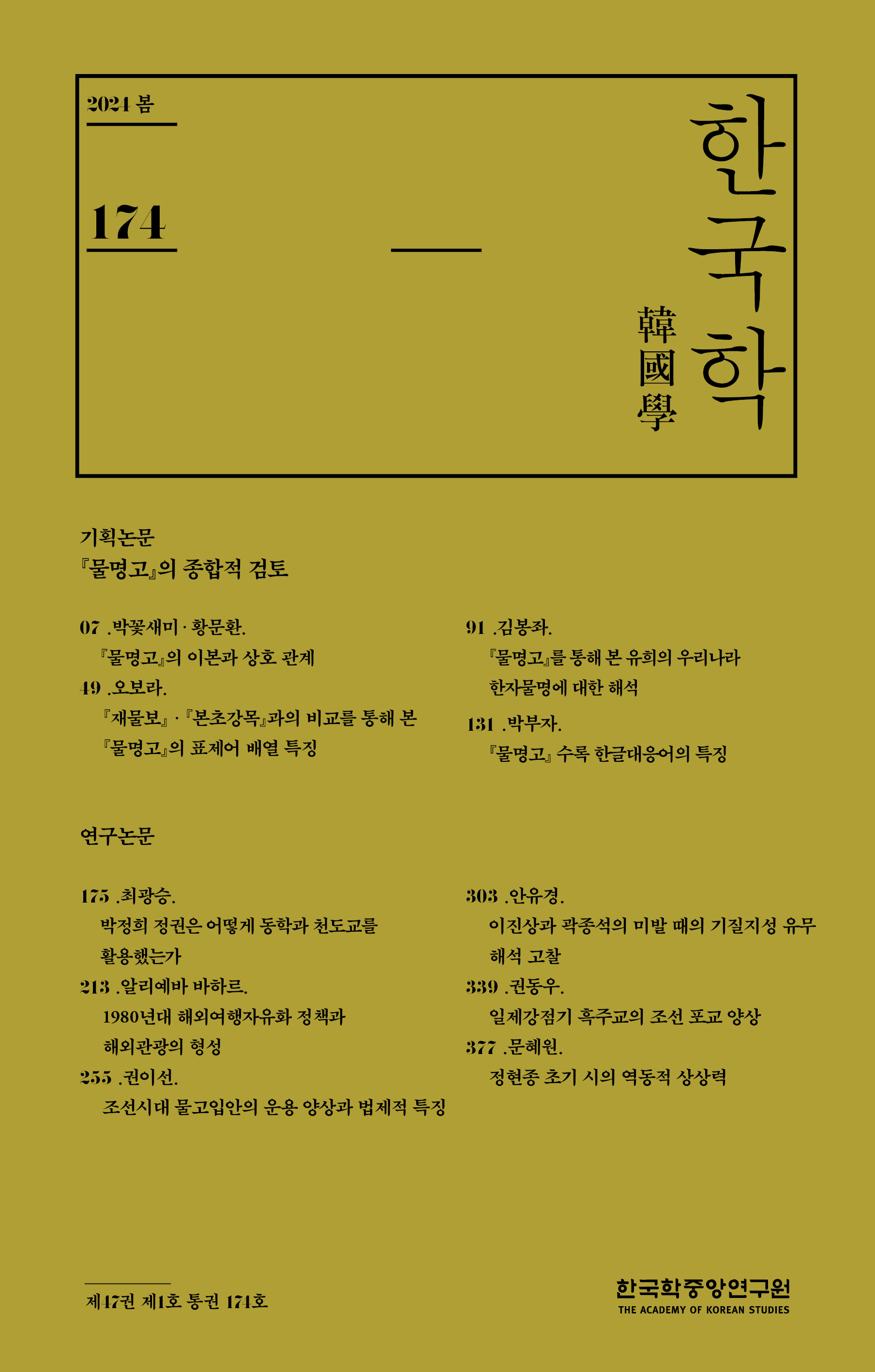
- P-ISSN 2671-8197
- E-ISSN 2733-936X
.jpg)
Among the Korean classical novels, there are Korean classical long novel and War novel as the representative type, which expose inclination for the upper level and embody positive patriarch as well. The types of these two novels have the same point showing a tendency to promote the regime. However, we can find meaningful dissimilarities when examine the embodiment of concrete patriarch. Through this we can estimate differing perception of charging group for the types of theses two novels. In the case of Korean classical long novel, the image of ideal patriarch with exemplary ability and personality is presented, and the political position of ruling clique high officials is concretely exposed. In this embodiment of patriarch, strong trust and self‒nconfidence about Confucian ideology are implied, also the consciousness, which intends to maintain and extend vested rights based on ruling ideology, seems to be related. However, we need to pay attention to the point which the ruling clique high officials are not only described abstractly lacking of actuality, which are derived from glamorization in the ideological view, but also embodied as the thoughtful and conscientious character in family relationships. This indicates the reflection of consciousness which charging group is inclined toward the ruling ideology based on Confucianism, on the contrary has positive mind about human nature and tries to approach the practical problems having concrete interest. In the case of War novel, remaining in the abstract level, the embodiment of patriarch doesn’t mach the image of authoritative patriarch. Therefore, real reality of novel does not agree with the name. Also the patriarch sometimes deviates from Confucian system and violates Confucian ideology. This indicates the refraction of the limitation of existence and recognition, particularity, which charging group can not describe the reality of authoritative patriarch, dreaming of prosperity of the family based on powerful patriarch, and is doubtful about Confucian patriarchy and domination based on it.
김두헌, 한국가족제도연구 . 서울대학교출판부, 1969.
김은아, 「전근대 중국의 가족공산제와 가부장의 권능에 관한 고찰」. 한양법학 12, 한양법학회, 2001, 253‒267쪽.
김종철, 「19세기 중반기 장편영웅소설의 한 양상 ‒옥수기, 옥루몽, 육미당기를 중심으로」. 한국학보 40, 일지사, 1985, 88‒108쪽.
박병호, 「한국의 전통가족과 가장권」. 한국학보 2, 일지사, 1976, 67‒93쪽.
박병호, 「한국에 있어서의 가부장제의 형성」. 한일 법학연구 , 한일법학회, 1988, 43‒54쪽.
서대석, 군담소설의 구조와 배경 . 이화여자대학교출판부, 1985.
설석규, 조선 중기 사림의 도학과 정치철학 . 경북대학교출판부, 2009.
송성욱, 「명주기봉에 나타난 규방에 대한 관심」. 고전문학연구 7, 한국고전문학회, 1992, 378‒404쪽.
엄태웅, 「<방한림전>에 나타난 가부장의 부재와 재현의 양상」. 우리어문연구 39, 우리어문학회, 2011, 89 ‒117쪽.
이광규, 한국가족의 구조분석 . 일지사, 1984.
이순형, 「조선시대 가부장제의 유학적 재해석」. 韓國學報 71, 일지사, 1993, 92‒119쪽.
이승복, 「<옥환기봉> 연작의 여성 담론과 소설사적 의미」. 고전문학과 교육 12, 한국고전문학교육학회, 2006, 283‒322쪽.
이지하, 옥원재합기연 연작 연구 . 서울대학교 박사학위논문, 2001.
이지하, 「여성주체적 소설과 모성 이데올로기의 파기」. 한국고전여성문학연구 10, 한국고전여성문학회, 2004, 137‒168쪽.
이지하, 「고전장편소설과 여성의 효의식 ‒<유효공선행록>과 <옥원재합기연>을 중심으로」. 한국고전여성문학연구 10, 한국고전여성문학회, 2005, 171‒199쪽.
임형택, 「17세기 규방소설의 성립과 <창선감의록>」. 동방학지 57, 연세대학교 국학연구원, 1988, 103‒176쪽.
장시광, 조선시대 동성혼 이야기 방한림전 . 한국학술정보, 2006.
장시광, 「<성현공숙렬기>에 나타난 부부갈등의 성격과 여성 독자」. 동양고전연구 27, 동양고전학회, 2007, 7‒37쪽.
정병설, 완월회맹연 연구 . 태학사, 1998.
정병설, 「조선 후기 정치현실과 장편소설에 나타난 소인의 형상 ‒완월회맹연과 옥원재합기연을 중심으로」. 국문학연구 4, 국문학회, 2000, 231‒259쪽.
조혜정, 한국의 남성과 여성 . 문학과 지성사, 1988.
최기숙, 「<현씨양웅쌍린기>에 나타난 “부부 관계”와 “결혼 생활”의 상상적 조율과문화적 재배치 ‒ “현경문 ‒주소저” 부부 관련 서사분석 중심으로」. 한국고전여 성문학연구 20, 한국고전여성문학회, 2010, 301‒337쪽.
한길연, 「<백계양문선행록>의 작가와 그 주변 ‒전주이씨 가문 여성의 대하소설 창작 가능성을 중심으로」. 고전문학연구 27, 한국고전문학회, 2005, 329 ‒361쪽.
한길연, 조선 후기 대하소설의 다층적 세계 . 소명출판, 2009.